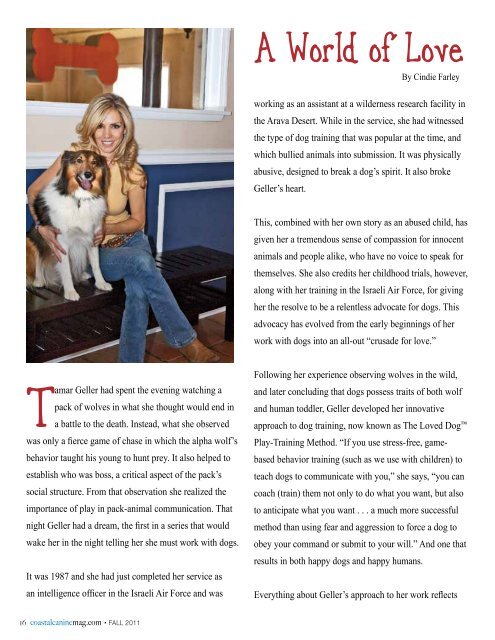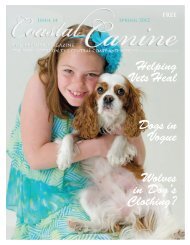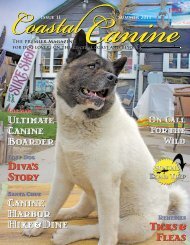For the Dogs - Coastal Canine Magazine
For the Dogs - Coastal Canine Magazine
For the Dogs - Coastal Canine Magazine
You also want an ePaper? Increase the reach of your titles
YUMPU automatically turns print PDFs into web optimized ePapers that Google loves.
A World of Love<br />
By Cindie Farley<br />
working as an assistant at a wilderness research facility in<br />
<strong>the</strong> Arava Desert. While in <strong>the</strong> service, she had witnessed<br />
<strong>the</strong> type of dog training that was popular at <strong>the</strong> time, and<br />
which bullied animals into submission. It was physically<br />
abusive, designed to break a dog’s spirit. It also broke<br />
Geller’s heart.<br />
This, combined with her own story as an abused child, has<br />
given her a tremendous sense of compassion for innocent<br />
animals and people alike, who have no voice to speak for<br />
<strong>the</strong>mselves. She also credits her childhood trials, however,<br />
along with her training in <strong>the</strong> Israeli Air <strong>For</strong>ce, for giving<br />
her <strong>the</strong> resolve to be a relentless advocate for dogs. This<br />
advocacy has evolved from <strong>the</strong> early beginnings of her<br />
work with dogs into an all-out “crusade for love.”<br />
Tamar Geller had spent <strong>the</strong> evening watching a<br />
pack of wolves in what she thought would end in<br />
a battle to <strong>the</strong> death. Instead, what she observed<br />
was only a fierce game of chase in which <strong>the</strong> alpha wolf’s<br />
behavior taught his young to hunt prey. It also helped to<br />
establish who was boss, a critical aspect of <strong>the</strong> pack’s<br />
social structure. From that observation she realized <strong>the</strong><br />
importance of play in pack-animal communication. That<br />
night Geller had a dream, <strong>the</strong> first in a series that would<br />
wake her in <strong>the</strong> night telling her she must work with dogs.<br />
It was 1987 and she had just completed her service as<br />
an intelligence officer in <strong>the</strong> Israeli Air <strong>For</strong>ce and was<br />
Following her experience observing wolves in <strong>the</strong> wild,<br />
and later concluding that dogs possess traits of both wolf<br />
and human toddler, Geller developed her innovative<br />
approach to dog training, now known as The Loved Dog <br />
Play-Training Method. “If you use stress-free, gamebased<br />
behavior training (such as we use with children) to<br />
teach dogs to communicate with you,” she says, “you can<br />
coach (train) <strong>the</strong>m not only to do what you want, but also<br />
to anticipate what you want . . . a much more successful<br />
method than using fear and aggression to force a dog to<br />
obey your command or submit to your will.” And one that<br />
results in both happy dogs and happy humans.<br />
Everything about Geller’s approach to her work reflects<br />
16 coastalcaninemag.com • fall 2011





